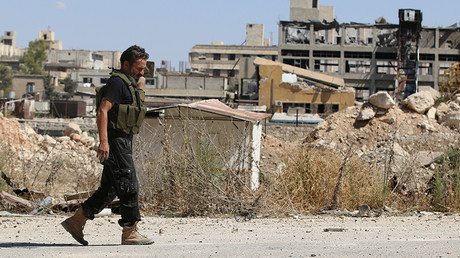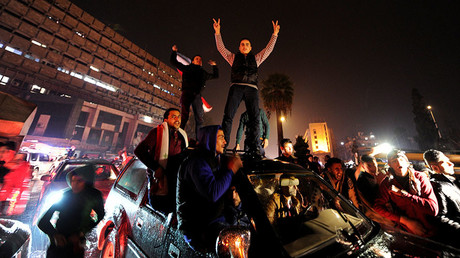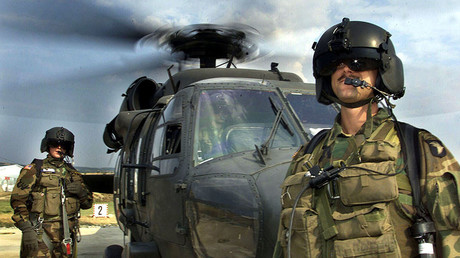US to balkanize Syria under Kurdish pretext
Ms. Marwa Osman. PhD Candidate located in Beirut, Lebanon. University Lecturer at the Lebanese International University and Maaref University. Political writer/commentator on Middle East issues with many international and regional media outlets.

As early as 2013, Western powers have been rooting for the balkanization of Syria as the best possible outcome of the war tearing apart the country since 2011.
Since the war against Syria is significant in this period of imperialism, watching how it was led by the US, imperialist proxies and their so-called allies, one can fully understand that the war against the Syrian Arab Republic has been decades in the making.
Throughout history, the imperialist powers have been facilitating and empowering the most intolerant, bigoted ideologies and groups in the region starting from the Balfour Declaration, passing through the infamous Sykes-Picot agreement and ending in the invasions of Iraq and Libya before making their way into Syria. The latest group to gain the full supportof the US on the ground in Syria is the Syrian Kurdish YPG forces (People's Protection Units).
The US threw its lot in with the Kurds in Iraq at first as it supposedly tried to find partners who reportedly pose a credible threat to ISIS. Thus, their pick of the Peshmerga Kurdish group came as a result of mutual interest in the region. The Kurds wanted to establish their own autonomous state in the region and the US wanted to reenter Iraq under the pretext of helping the Kurds fight ISIS.
Kurdish Political Ambitions
The first direct coordination between US forces and Kurdish groups was between October 2014 and January 2015 in the battle of Kobani, inside Syria, where Kurdish forces reached out to the Americans after ISIS forces surrounded them. The US then hit the terrorist group’s targets in the area with airstrikes, while the Kurdish forces on the ground assaulted ISIS positions that ended up inflicting heavy losses on the terrorists and drove them out of the area.
This battle represented a historic opportunity for both political wings of the Kurdish movement, the Iraqi Peshmerga and the Syrian PYD (The Democratic Union Party) to realize their dream of independence. The PYD’s armed forces known as the YPG (People's Protection Units), which has a fighting force of 50,000 fighters, became determined to take control of the vast majority of Syria's border with Turkey fully backed by US airpower.
The PYD then stated that its priority focused on uniting traditional Kurdish areas of Syria (known as Rojava), extending from Afrin to the Tigris river into one attached land mass.
That statement took me back to the words of former US Secretary of State Henry Kissinger in 2013 when he commented on the Syrian situation, expressing his preference for a broken-up and balkanized Syria to emerge out of the current so-called “Assad-controlled unity.” The man said he supports the partitioning of a unified state.
Oldest plan in the book: Balkanize Syria
The US’s vision of the future Syrian map was detailed by Kissinger during a presentation at the Ford School Syria with pretty much a distorted history lesson. He stated that Syria was not a historic state “It was created in its present shape in 1920, and it was given that shape to facilitate the control of the country by France, which happened to be after a UN mandate,” he said.
Kissinger then claimed that the current Syria was conceived as a more or less artificial national unity consisting of different tribes and ethnic groups.
This same theory was also presented by the Israeli Oded Yinon plan which is an article published in February 1982 in the Hebrew journal Kivunim ("Directions") entitled A Strategy for Israel in the 1980s. This plan is an early example of characterizing political projects in the Middle East in terms of a logic of sectarian divisions and the dissolution of all the existing Arab states.
Hence, supporting the partitioning of Syria began with the US and Israel’s full support of the so- called “Rojava Project”.
US helping Kurds put plan into effect
The US’ support for the YPG has gained public sympathy in the West viewing the Kurds as the most forward-thinking “rebel” group in the battle against extremism. The same cannot be said for the countless factions receiving aid from regional backers, many of which have cooperated with Al-Qaeda's Syrian affiliate, Nusra Front (Ahrar Al Sham).
However, you would have thought that the PYD's connections to the Kurdistan Workers' Party (PKK) - a US, EU, and Turkey-designated terror group - are problematic. Despite this fact, the US appears to be committed to maintaining its air support for the Syrian Kurds, both near the Euphrates in the west and the outskirts of Raqqa in the south.
Thus since the US favors the balkanization of Syria, it is now working openly to empower Syrian and Iraqi Kurds. So by choosing sides, the US may be signaling that it is preparing for all contingencies, including the fracturing of Syria and the complete collapse of the state in Raqqa.
During the past couple of weeks, Raqqa, ISIS's main urban base of operations in Syria, is the focus of an ongoing campaign by the newly formed US-backed Syrian Democratic Forces (SDF). The SDF is a coalition of Kurdish (YPG), Sunni Arab (FSA-Free Syrian Army) and Syriac Christian fighters, but is completely dominated by its Kurdish element (YPG).
The main Syrian Kurdish militia, the YPG, already controls swathes of northern Syria as well, where Kurdish groups and their allies are working to establish a decentralized system of government in areas captured from ISIS. This political project is causing deep alarm in Damascus, which sees the YPG and its political affiliate, the PYD, as a potential threat with their current loud and clear alliance with the US.
According to Reuters, Saleh Muslim, the co-chair of the Syrian Kurdish PYD party, stated that the northern Syrian city of Raqqa is expected to join a decentralized system of government being set up by Syrian Kurdish groups and their allies once it is freed from ISIS.
As per these comments, I spoke with Fares Shehabi, a member of the Syrian Parliament for Aleppo and Chairman of the Syrian Federation of Industry who firmly guaranteed that “the statement of Saleh Muslim is irresponsible since the Syrian government will not recognize any presence in Raqqa or any other province other than the legitimate Syrian state represented by the Syrian Arab Army.”
As I spoke with Mr. Shehabi, a heavy US-backed operation near Raqqa was blocking any advance by the Syrian Arab Army from the west in preparation for the balkanization process. Thus I asked Mr. Shehabi where the Syrian government stands from this process as seemingly the Kurdish forces are fully under the control of the US. The Syrian MP responded resolutely that “no balkanization of Syria will be allowed” stating that “the Kurdish Forces do not have the field power to enter or stay in Raqqa because that would cause an unwanted and unrealistic change in the fabric of the city.” Mr. Shehabi then explained that any sort of a Kurdish uncalculated incursion whether from YPG or SDF on the city of Raqqa would backfire since their move will not be accepted or tolerated in the city.
In March, the SDF announced it had captured the Tabqa air base, 45 kilometers (28 miles) west of Raqqa, with direct US substantial air and ground support provided.
The Telegraph reported on that mission that five helicopters, supported by five fighter jets, dropped dozens of SDF fighters near the northern town of Shurfa without stating whether or not US soldiers accompanied them.
Meanwhile, the Syrian Arab Army’s main ally Russia has always been aware of US plans to pull Raqqa into a “decentralized” government, which would be the first step toward balkanizing Syria. As early as October of 2014, Sputnik reported:
The Pentagon’s reliance on Kurds to liberate Raqqa may indicate that the US is actually ready to support the federalization of Syria, said Alexander Babakov, a member of the Foreign Affairs Committee at the upper house of the Russian parliament.
“It would be hard to imagine that American plans on Raqqa are aimed only to bring peace to Syria. It cannot be ruled out by using Kurds to liberate the city from Daesh the US wants to support the federalization of Syria, including establishing an autonomous Kurdish region,” Babakov told the Russian newspaper Izvestia.
Therefore, since the United States and Israel have never denied their aspiration to see Syria divided up into small, vulnerable and easily manipulated territories, and since the Kurds have provided the US and Israel with the pretext to do so, it remains to be seen how the Syrian government and its allies will respond. Now that a foreign army and its proxies are blocking the Syrian Army from liberating its own country from terrorists, we wait to see if balkanization is next.








Geen opmerkingen:
Een reactie posten